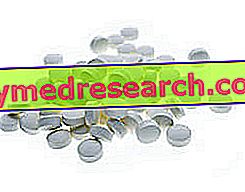Premise
The diet to combat diarrhea consists of a series of recommendations on foods to choose from and those to avoid to help resolve the disorder and restore the body to what is lost due to it.

First of all, note that diarrhea can be a sign of potentially serious conditions (chronic inflammatory bowel diseases, intestinal polyps, colon cancer, peptic ulcers, infections of bacteria and parasites ...), which is why a medical consultation is always appropriate.
Foods to Avoid
Fat-rich foods
The diarrhea diet recommends avoiding particularly fatty foods, including seasonings and fried foods.
The high lipid content can in fact exacerbate the contractions of an intestinal tract already sensitized by the disorder.
Foods with Lactose
The second category of foods to avoid, regardless of whether you suffer from lactose intolerance or not, is that of dairy products.
In fact, diarrhea reduces the intestinal enzymatic heritage, including the lactase needed to digest the typical milk sugar.
The reduced activity of this enzyme prevents the digestion and absorption of lactose contained in food; consequently, there is a recall of water due to osmotic effect and a series of symptoms such as meteorism, flatulence, nausea and diarrhea.
We therefore advise against the consumption of milk, ice creams and fresh or fermented cheeses (even those with seasoned hard cheeses which, although lactose-free, are too rich in fat).
Artificial Sweeteners
Some sweeteners used to replace sugar have a marked laxative effect, which can aggravate the symptoms of this annoying disorder; this is the case, for example, of polyols (sorbitol, mannitol, xylitol and others).
The diet for diarrhea therefore excludes chewing gum, sweets, drinks and confectionery without sugar, and sweeteners in tablets.
Foods that Cause Meteorism
The same goes for beans, broccoli, cabbage, cauliflower, onions, peas and all the other foods that increase intestinal gases, such as smoothies and carbonated drinks.
Irritating foods
Due to their irritating effect on the mucous membranes of the digestive system, in the presence of diarrhea it is a good rule to exclude coffee, chocolate, chilli and alcohol from your diet.

Importance of Food Hygiene
Particular attention must be paid to the consumption of potentially dangerous foods, such as those that are not properly cleaned, prepared and stored.
Fish or fresh eggs, for example, are a common vehicle of food-borne diseases, particularly dangerous in an organism already weakened by the disorder.
For this reason, in the presence of diarrhea, it is even more important to respect some simple and fundamental hygiene rules, such as the careful washing of food, the generous cooking of eggs, meat and derivatives (mayonnaise, tiramisu, etc.), and the scrupulous cleaning of the surface on which food is prepared.
Hands should be washed carefully both before preparing food and after handling raw meat; these must be separated from those cooked to avoid cross-contamination.



